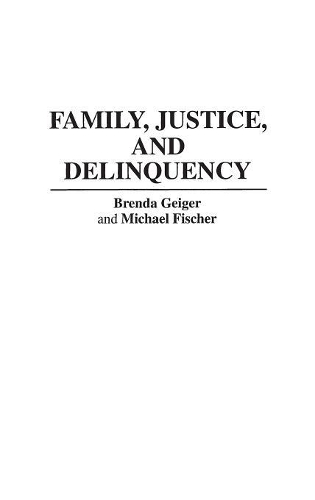
Family, Justice, and Delinquency
(Hardback)
Publishing Details
Family, Justice, and Delinquency
By (Author) Michael Fischer
By (author) Brenda Geiger
Bloomsbury Publishing PLC
Praeger Publishers Inc
30th January 1995
United States
Classifications
Tertiary Education
Non Fiction
Age groups: children
Age groups: adolescents
Child, developmental and lifespan psychology
Crime and criminology
305.231
Physical Properties
Hardback
168
Description
Nuclear family and kibbutz childrearing practices are compared from a Rawlsian perspective of justice. Based upon the kibbutz educational system, which has reinstituted the family, Geiger and Fischer propose a model of educational change for consideration in the United States. This model is designed to strengthen the nuclear family while improving the prospects of disadvantaged, anomic, and unattached youth. Geiger and Fischer examine, within a Rawlsian perspective, several child-rearing institutions affecting children. Justice as fairness would consider a child-rearing institution and its inequalities as fair if there are no alternative arrangements under which the prospects of least-advantaged children could be improved. Among these least-advantaged children are those who are neglected, abused, and stripped of self-respect. As the nuclear family disintegrates, the authors ask whether it can fulfill its child-rearing function. Utilizing a self-report study conducted on socialization and delinquency in Israel as well as several other observational studies, the authors demonstrate that in a more egalitarian structure such as the kibbutz, least-advantaged children have more opportunities to develop into autonomous responsible individuals. For Americans, the kibbutz educational system shows new paths for change from nursery school through high school that would allow for greater bonds between the family, school, work, and the community. An emerging sense of community would also stimulate the moral and intellectual growth of disadvantaged youth. This book is recommended to researchers and policy makers in the areas of education, delinquency, and social welfare.
Author Bio
BRENDA GEIGER, educational psychologist and philosopher, and MICHAEL FISCHER, criminal justice researcher and social scientist, have written on child development and delinquency issues./e Their recent publications include Reform through Community (Greenwood Press, 1991) and two journal articles: A Model for Change Following the Kibbutz Resocialization Program (1994) and Stimulating Moral Growth in the Classroom: A Model (1994).
